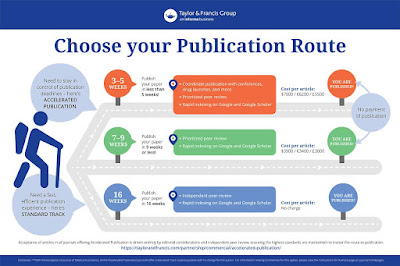Academic publisher Taylor & Francis are offering a new service: “accelerated publication.” expedited review.
An example:
Publish in 3 – 5 weeks from submission
- Submission to acceptance: 2-3 weeks
- 1-2 weeks for peer review
- week for author revision
- Acceptance to online publication: 1-2 weeks, with proofs within 5 working days and 48 hours for author review
- Cost per article: $7000 / €6200 / £5500
Of that $7,000 (US dollars, presumably – hey everyone, currencies of many nations are called “dollars”), a small sliver of that goes to reviewers: “In recognition of the time constraints required of them, reviewers of Papers taking the 3-5 weeks option are paid an honorarium of $150.”
Of course, there are some people who will complain that 5 weeks to publication is still too long because there are a lot of academics with unreasonable expectations of how long peer review should take.
So now we enter the cycle.
Step 1: Academic publisher says something about journal operation that involves money.
Step 2: Academics complain.
In this case, there’s good reason to complain. This scheme has issues. But I’m not going to do a detailed analysis of problems with paying for “accelerated publication,” because other people are going to do it better.
Instead, I want to point out that this is a 💯 percent predictable outcome of the pressures on academics.
There are a lot of academics whose publishing strategy is, “Send it to someplace with high probability of acceptance and get it out anywhere as fast as possible.” Heck, I see questions on Quora almost daily: “What is a journal in [field] with high acceptance rates, fast publication, and no article processing charges?”
(I’m surprised they don’t ask for a pony, too.)
I don’t think it’s any coincidence that the Taylor & Francis “accelerated publication” scheme looks like MDPI’s publishing model. I think both are being driven by the same forces.
I can’t prove it, but I strongly suspect that many of these academics prioritizing high acceptance and fast turnaround are not in G20 countries. This might explain why discussions of things like “accelerated publication” and MDPI on the Twitter community I’m in (G20, English speaking) are so negative, but publishers keep acting like there is high demand for this kind of publication.
If publishers are responding to demands from academics, we should be asking why customers want the things they want. Who are the authors who are freaking out so much over a few extra weeks in review and why?


No comments:
Post a Comment
Comments are moderated. Real names and pseudonyms are welcome. Anonymous comments are not and will be removed.